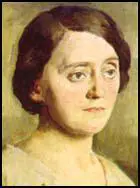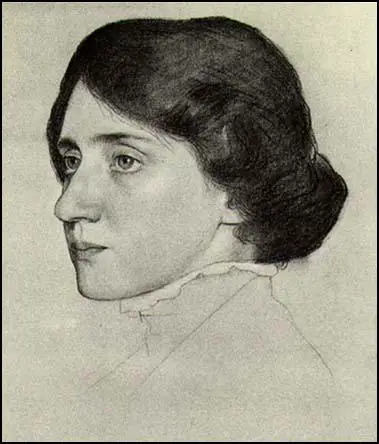Florence Dugdale Hardy

Florence Emily Dugdale, the daughter of Edward and Emma Dugdale, was born in 1879. Her father was headmaster of St Andrew's National School in Enfield.
Florence became a schoolteacher and was the author of several textbooks. Friends claimed that she was an extremely modest person. Florence wrote to Rebekah Owen: "After considering them long and earnestly I am bound to confess that I have no claims at all to anything approaching good looks."
In 1904 Florence was introduced to Thomas Hardy, the famous author. Hardy, who was 64 at the time, was attracted to Florence and invited her to help him with the research for his latest project, The Dynasts: A Drama of the Napoleonic Wars. As the author of Thomas Hardy: Behind the Mask (2011) has pointed out: "The Dynasts is the longest dramatic composition in English literature. It is an historical narrative, written mainly in blank verse, but also in other metres and in prose, featuring France's Emperor Napoleon Bonaparte".
In April 1907 Hardy wrote to Florence's headmaster requesting that "Miss Dugdale" be permitted to be absent from school for a day, in order that she might join him in some research at the South Kensington Museum. Later that year he wrote to his friend, Alexander Macmillan, recommending Florence to the post of assistant at his publishing firm "in the preparation of school books and supplementary readers."
Dugdale spent long periods in Hardy's home at Max Gate near Dorchester. In a letter to her friend, Edward Clodd, in November 1910, she commented on the strange behaviour of his wife Emma Hardy: "Mrs Hardy seems to be queerer than ever. She has just asked me whether I have noticed how extremely like Crippen, Thomas Hardy is in personal appearance. She added darkly, that she would not be surprised to find herself in the cellar one morning. All this in deadly seriousness."
The writer, Arthur C. Benson met her for the first time in September, 1912. He wrote in his diary: "Mrs Hardy is a small, pretty, rather mincing elderly lady with hair curiously puffed and padded and rather fantastically dressed. It was hard to talk to Mrs Hardy who rambled along in a very inconsequentional way, with a bird-like sort of wit, looking sideways and treating my remarks as amiable interruptions... It gave me a sense of something intolerable the thought of his having to live day and night with the absurd, inconsequent, huffy, rambling old lady. They don't get on together at all. The marriage was thought a misalliance for her, when he was poor and undistinguished, and she continues to resent it... He (Hardy) is not agreeable to her either, but his patience must be incredibly tried. She is so queer, and yet has to be treated as rational, while she is full, I imagine, of suspicions and jealousies and affronts which must be half insane."
Evelyn Evans, a member of the Dorchester Debating Literary and Dramatic Society, was a regular visitor to Hardy's home. She later recalled: "She (Emma Hardy) was considered very odd by the townspeople of Dorchester... Her delusions of grandeur grew more marked. Never forgetting that she was an archdeacon's niece who had married beneath her.. She persuaded embarrassed editors to publish her worthless poems, and intimated that she was the guiding spirit of all Hardy's work."
In one letter Emma Hardy described Hardy as "utterly worthless". Thomas Hardy's assistant, Florence Emily Dugdale, remarked that he "spent long evenings alone in his study, insult and abuse his only enlivenment. It sounds cruel to write like that, and in atrocious taste, but truth is truth, after all."
Christine Wood Homer was another regular visitor to Max Gate. She claims that Emma Hardy "had the fixed idea that she was the superior of her husband in birth, education, talents, and manners. She could not, and never did, recognise his greatness". As she got older he behaviour became stranger: "Whereas at first she had only been childish, with advancing age she became very queer and talked curiously." Emma's cousin, Kate Gifford, wrote to Hardy saying "it must have been very sad for you that her mind became so unbalanced latterly".
On Hardy's 72nd birthday, he was visited by the poets Henry Newbolt and W. B. Yeats. Newbolt later recalled: "Hardy, an exquisitely remote figures, with the air of a nervous stranger, asked me a hundred questions about my impressions of the architecture of Rome and Venice, from which cities I had just returned. Through this conversation I could hear and see Mrs. Hardy giving Yeats much curious information about two very fine cats... In this situation Yeats looked like an Eastern Magician overpowered by a Northern Witch - and I too felt myself spellbound by the famous pair of Blue Eyes, which surpassed all that I have ever seen."
On 22nd November, 1912, Emma Hardy felt unwell. She was visited by her doctor who pronounced that the illness was not of a serious nature. However, on the morning of 27th November, the maid found her dead in bed. Soon after the funeral, Hardy discovered two "book-length" manuscripts, The Pleasures of Heaven and the Pains of Hell and What I Think of My Husband. After reading them Hardy burnt them in the fire.
After the death of his wife, Hardy saw a great deal more of Florence. Hardy married the 35-year-old Florence, on 10th February 1914, at St. Andrew's Church in Enfield. The couple did not have a honeymoon, but returned to Max Gate. Hardy, who was approaching his 74th birthday. Hardy described Florence as a "tender companion". However, the parlour-maid Ellen Titterington, commented that the couple "occupied separate bedrooms with a common dressing-room between."
Andrew Norman, the author of Thomas Hardy: Behind the Mask (2011) has argued: "Florence Emily Hardy was, in many ways, the complete antithesis of Emma, and in consequence, the changes which she brought about to Hardy's life were truly remarkable... Florence did all in her power to make Hardy's life bearable." She wrote to a friend: "I think he really needs affection and tenderness more than anyone I know - life has dealt him some cruel blows."

Florence Dugdale Hardy wrote to Edward Clodd about life with Thomas Hardy: "His life here is lonely beyond words, and he spends his evenings in reading and re-reading voluminous diaries that Mrs H. has kept from the time of their marriage. Nothing could be worse for him. He reads the comments upon himself - bitter denunciations, beginning about 1891 and continuing until within a day or two of her death - and I think he will end by believing them." Florence told another friend that she felt towards him "as a mother towards a child with whom things have somehow gone wrong - a child who needs comforting - to be treated gently and with all the love possible."
Although he gave up writing novels after Jude the Obscure Hardy continued to write poems. He would sit at his writing-table every morning at 10 a.m. If the spirit moved him, he would write; if it did not, he would find something else to do. He published several volumes of poetry during his last years, including Moments of Vision (1917), Late Lyrics (1922), Human Shows (1925) and Winter Words (1928).
On 25th December, 1927, Hardy wrote to his friend, Edmund Gosse: "I am in bed on my back, living on butter-broth and beef tea, the servants being much concerned at my not being able to eat any Christmas pudding."
Thomas Hardy never recovered from this last illness and died aged 87 on 11th January 1928. Hardy's ashes were interred in Westminster Abbey in Poets' Corner on 16th January. The last novelist to be buried there prior to this was Charles Dickens in 1870.
Florence wrote to Siegfried Sassoon after Hardy's death: "I do not think I shall take a house in London, or make any change in my life. I feel that I belong to Max Gate where I can visit Stinsford and go to see my husband's sister (Katharine) every few days."
Florence Dugdale Hardy died at Max Gate after a long illness on 15th October 1937.
Primary Sources
(1) Andrew Norman, Thomas Hardy: Behind the Mask (2011)
Florence Emily Hardy was, in many ways, the complete antithesis of Emma, and in consequence, the changes which she brought about to Hardy's life were truly remarkable... Florence did all in her power to make Hardy's life bearable.
(2) Florence Dugdale Hardy, letter to Edward Clodd (16th January, 1913)
His life here is lonely beyond words, and he spends his evenings in reading and re-reading voluminous diaries that Mrs H. has kept from the time of their marriage. Nothing could be worse for him. He reads the comments upon himself - bitter denunciations, beginning about 1891 and continuing until within a day or two of her death - and I think he will end by believing them.
